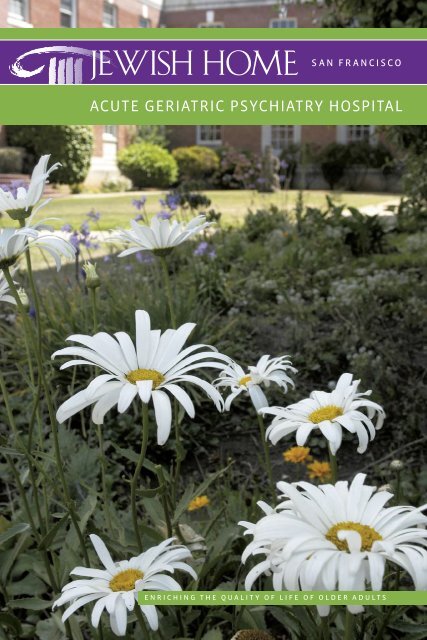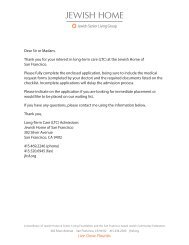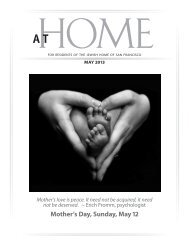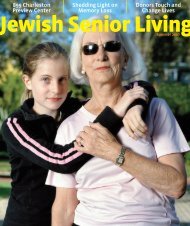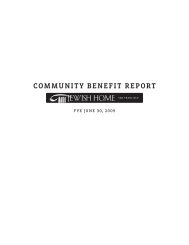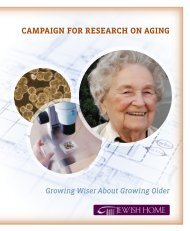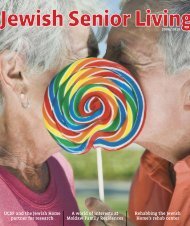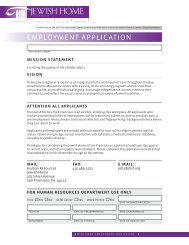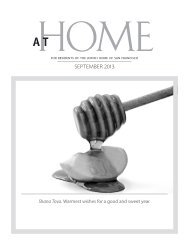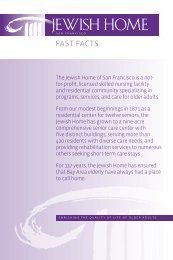acute geriatric psychiatry hospital - Jewish Home of San Francisco
acute geriatric psychiatry hospital - Jewish Home of San Francisco
acute geriatric psychiatry hospital - Jewish Home of San Francisco
- No tags were found...
You also want an ePaper? Increase the reach of your titles
YUMPU automatically turns print PDFs into web optimized ePapers that Google loves.
S a n F r a n c i s c oACUTE GERIATRIC PSYCHIATRY HOSPITALe n r i c h i n g t h e q u a l i t y o f l i f e o f o l d e r a d u l t s
ADMISSION CRITERIA:In general, applicants must:• n Be aged 55 or older.• n Have a primary psychiatric diagnosis requiring <strong>acute</strong> in-patient treatment.• n Be admitted on a voluntary basis. Applicants must have the cognitivecapacity to understand that they are being admitted to a psychiatric<strong>hospital</strong> and that their admission is voluntary.• n Individuals aged 75 or older may be admitted on an involuntary basis.• n Be able to participate in our treatment program.• n Have medical clearance. Within the past 24 hours, the patient shouldhave been medically evaluated for non-psychiatric conditions that couldaccount for current symptoms or medical instability.• n If the voluntary applicant has a history <strong>of</strong> dangerous behavior, suicideattempts or homicidal threats, the <strong>Jewish</strong> <strong>Home</strong>’s psychiatrist must assessthe risk before authorizing admission.• n Be insured through Medicare or Kaiser. Admission <strong>of</strong> all Kaiser patientsmust be authorized by Kaiser’s psychiatric call center.Phone: 415.572.8280 (direct) 415.469.2325 (direct) 415.334.2500 (general)fax: 415.586.9174
EXAMPLES OF IN-PATIENT REFERRALSEighty-five-year-old Ruth, post-CVA with right-side neglect, lives in a boardand-carehome. She ambulates with the aid <strong>of</strong> a walker. Ruth is not eating, fallsfrequently, and is difficult to motivate to get out <strong>of</strong> bed, <strong>of</strong>ten stating that shewishes to die. The board-and-care operator will accept her return after she nis stabilized.Henry (55) has a history <strong>of</strong> chronic paranoid schizophrenia. He lives in a residentialcare facility and sees his out-patient psychiatrist once a month. Within the pasttwo weeks he has developed insomnia and is expressing new delusions abouthaving cancer. Henry is paranoid about his roommate, and although he hasthoughts <strong>of</strong> hurting him, he has not been violent.Now aged 63, George suffers from hypertension, diabetes, and hypothyroidism. nHe lives at home with his elderly wife. He has grown more depressed, is eating verylittle, and will not get out <strong>of</strong> bed. His involved primary care physician instituteda trial course <strong>of</strong> Prozac, which resulted in anxiety and insomnia. With additionalin-home assistance, George will be able to return home after <strong>hospital</strong>ization.Sylvia (73) is in the early stages <strong>of</strong> presumed Alzheimer’s disease. She has startedto pace and engage in hand-wringing, repeatedly asks to see her mother, and hasbecome resistant to care. She spits out her medication. She lives at home withround-the-clock caregivers.Seventy-six-year-old Martin has Parkinson’s disease, for which he takes three nanti-Parkinson medications. He is experiencing visual hallucinations, confusion,and anxiety. Martin lives at home with his spouse, where they receive minimal nin-home help. He attends an adult day health program three days per week.<strong>Jewish</strong> <strong>Home</strong> 302 Silver Avenue <strong>San</strong> <strong>Francisco</strong>, CA 94112 www.jhsf.org 415.334.2500


